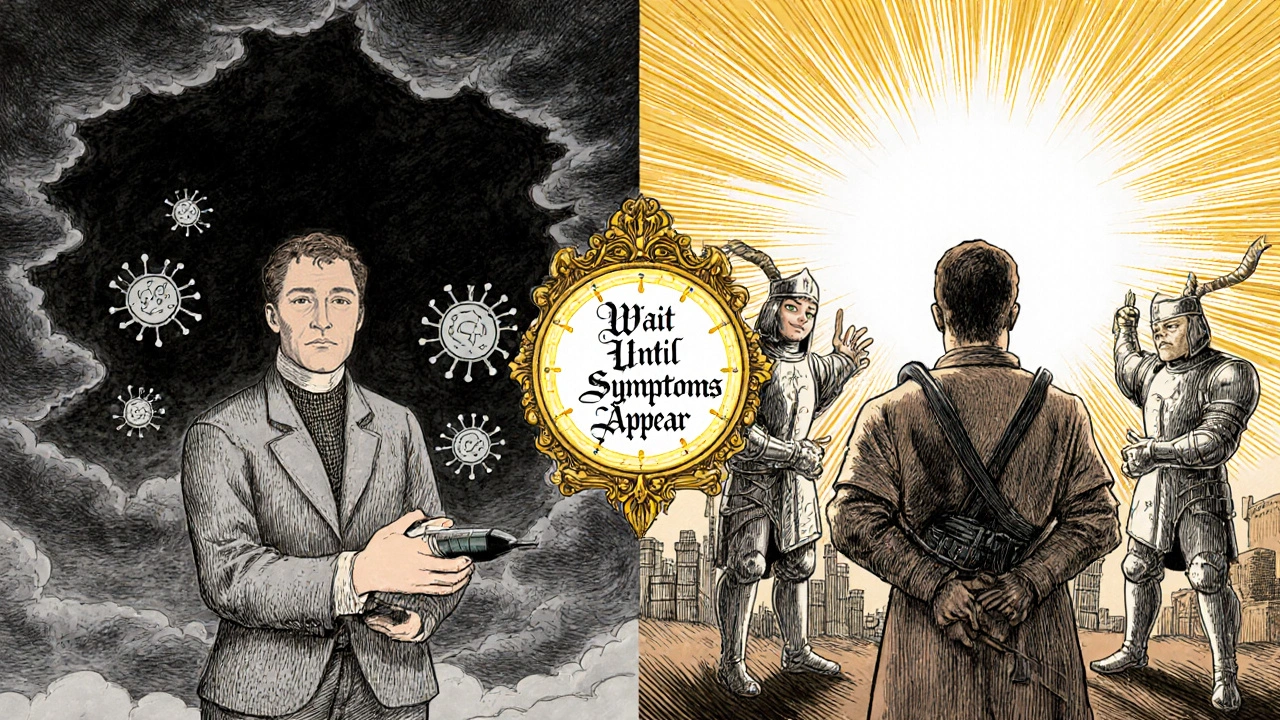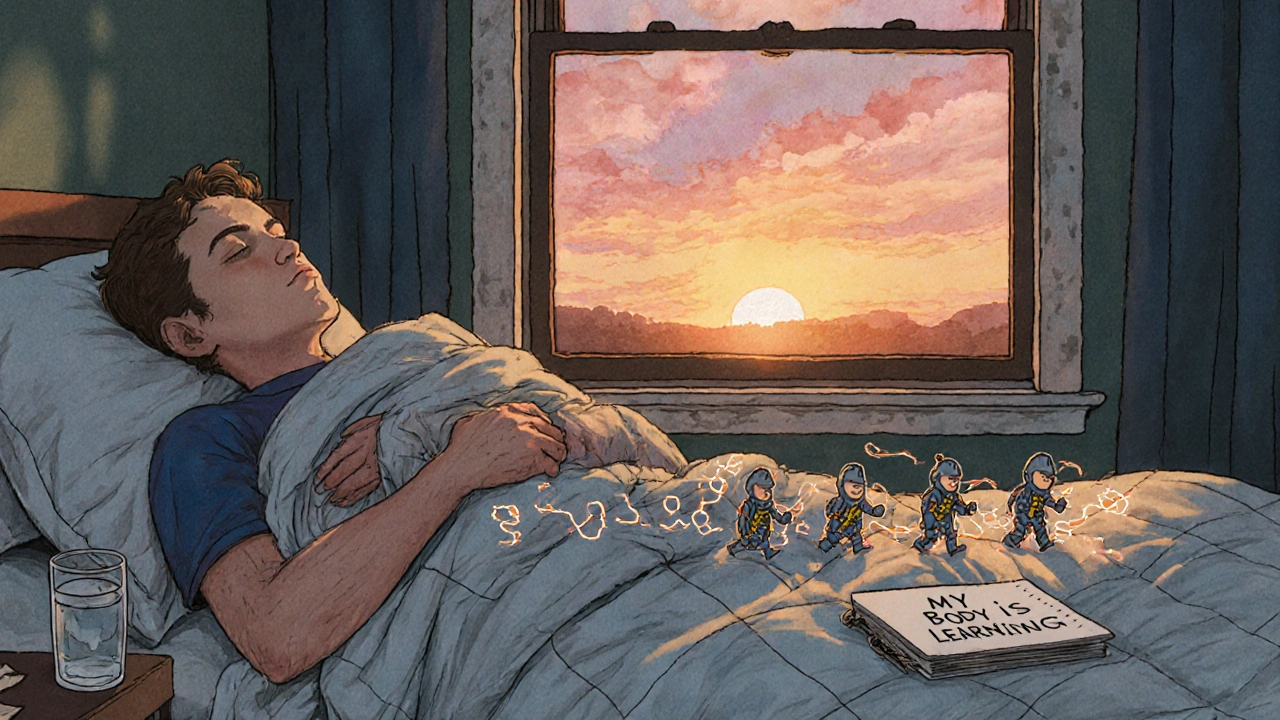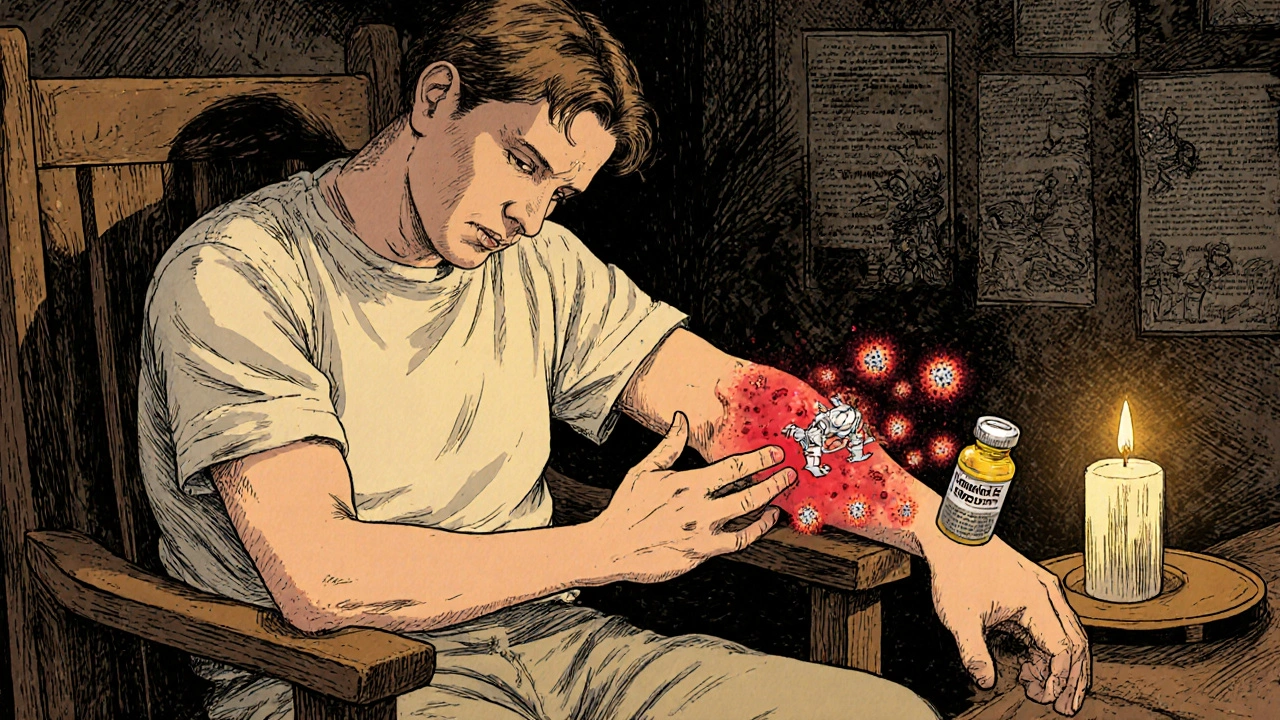Getting a vaccine can leave you feeling sore, achy, or even feverish. It’s not the vaccine itself causing this-it’s your immune system doing its job. But that doesn’t make the discomfort any easier to deal with. For many people, ibuprofen is the go-to solution. But is it the right choice? And when should you take it? Let’s cut through the noise and look at what actually works.
Why you feel bad after a vaccine
Your body doesn’t recognize the vaccine as harmless. It sees the spike protein or viral fragment as an invader and kicks into high gear. White blood cells swarm the injection site. Inflammatory chemicals like prostaglandins flood your system. That’s what causes the redness, swelling, and pain at the shot site. It’s also what triggers fever, chills, and muscle aches.
This reaction isn’t a sign something went wrong. It’s proof your immune system is learning. Studies show people who report stronger side effects after the COVID-19 vaccines actually developed better antibody responses. Feeling bad after a shot doesn’t mean you’re sick-it means your body is building protection.
How ibuprofen works
Ibuprofen is a nonsteroidal anti-inflammatory drug, or NSAID. It blocks enzymes called COX-1 and COX-2, which make prostaglandins. These chemicals don’t just cause pain-they also raise your body’s thermostat, leading to fever. By reducing prostaglandin production, ibuprofen lowers fever and eases inflammation-driven pain.
It’s not a cure. It doesn’t stop your immune system from working. It just turns down the volume on the symptoms. Think of it like turning off a loud alarm after a fire drill. The drill still happened. The building is still safer. You just don’t have to sit through the noise.
When to take ibuprofen after a vaccine
Don’t take it before the shot. Multiple studies, including one published in The Lancet in 2021, found that taking NSAIDs before vaccination might weaken the immune response. Your body needs those prostaglandins to kickstart antibody production. Blocking them upfront could make the vaccine less effective.
Wait until symptoms show up. If you wake up with a headache and a sore arm, that’s your cue. Take ibuprofen only if you’re uncomfortable. You don’t need to prevent every minor ache. Many people feel fine without any medication at all.
For most adults, the standard dose is 200 to 400 mg every 4 to 6 hours. Don’t exceed 1,200 mg in 24 hours unless directed by a doctor. If you’re over 65, have kidney issues, or take blood thinners, talk to your pharmacist first. Ibuprofen isn’t safe for everyone.
Ibuprofen vs. acetaminophen: which is better?
Acetaminophen (paracetamol) is the other common choice. It reduces fever and pain but doesn’t fight inflammation the way ibuprofen does. That makes it a gentler option for people with stomach sensitivities or those on blood pressure meds.
Here’s how they compare:
| Feature | Ibuprofen | Acetaminophen |
|---|---|---|
| Reduces inflammation | Yes | No |
| Reduces fever | Yes | Yes |
| Relieves muscle aches | Yes | Moderately |
| Stomach irritation risk | Higher | Lower |
| Liver risk at high doses | No | Yes |
| Best for localized pain (e.g., sore arm) | Yes | No |
If your main issue is a sore, swollen arm, ibuprofen wins. If you’re running a fever and feel achy all over, either works. If you have a history of stomach ulcers or take aspirin for heart protection, acetaminophen is safer.

What not to do
Don’t take ibuprofen just because you think you should. Many people pop pills preemptively out of habit. That’s unnecessary and possibly counterproductive.
Don’t mix it with other NSAIDs. That means no Advil and naproxen together. No aspirin unless your doctor told you to take it daily. Overlapping doses increase the risk of stomach bleeding and kidney stress.
Don’t use it for more than 2-3 days after vaccination. If your fever lasts longer than 48 hours or your arm pain gets worse after 3 days, see a doctor. That’s not a normal reaction-it could be an infection or something else.
When to skip ibuprofen entirely
You should avoid ibuprofen if you:
- Have a history of stomach ulcers or bleeding
- Have severe kidney disease
- Are in your third trimester of pregnancy
- Are allergic to NSAIDs
- Take blood thinners like warfarin or apixaban
For these groups, acetaminophen is the preferred option. If you’re unsure, ask your pharmacist. They can check your medications and flag any interactions.
Non-medication ways to feel better
You don’t always need pills. Simple steps can help a lot:
- Move your arm gently. Don’t keep it stiff. Light stretching helps reduce stiffness and improves circulation.
- Apply a cool, damp cloth to the injection site. Avoid ice directly on the skin-wrap it in a towel first.
- Drink plenty of water. Dehydration can make fever and fatigue worse.
- Rest. Your body is working hard. Don’t push yourself to run errands or work overtime.
- Wear loose clothing. Tight sleeves can irritate a sore arm.
These methods won’t replace ibuprofen if you’re in real discomfort. But they can reduce how much you need-and help you recover faster.

What the experts say
The CDC and WHO both state that it’s okay to take pain relievers after vaccination if you need them. But they stress: don’t take them before unless you have a medical reason.
Research from the University of Oxford tracked over 10,000 vaccine recipients in 2022. Those who took ibuprofen only after symptoms appeared had the same immune response as those who took nothing. Those who took it before vaccination had slightly lower antibody levels-enough to matter, but not enough to make the vaccine fail.
Bottom line: Wait. See how you feel. Then act only if needed.
What to expect and when to worry
Normal side effects usually show up within 24 hours and fade within 1-3 days. Mild fever (under 38.5°C), fatigue, headache, and soreness at the injection site are all expected.
Call your doctor if you notice:
- Fever above 39°C that doesn’t come down with medication
- Redness or swelling spreading beyond the injection site after 48 hours
- Difficulty breathing, chest pain, or heart palpitations
- Swelling of the face, lips, or tongue
- Pain that gets worse instead of better
These are rare but serious signs. Don’t wait. Get help.
Can I take ibuprofen before getting a vaccine to prevent side effects?
No. Taking ibuprofen before vaccination may reduce your immune system’s ability to respond to the vaccine. Studies show lower antibody levels in people who took NSAIDs before getting shots. Wait until after you feel symptoms before taking anything.
Is it safe to take ibuprofen after a COVID-19 vaccine?
Yes, it’s safe to take ibuprofen after a COVID-19 vaccine if you’re experiencing pain or fever. The CDC and other health agencies confirm this. Just avoid taking it before the shot. Stick to the recommended dose and don’t use it for more than a few days.
Does ibuprofen make vaccines less effective?
Only if taken before vaccination. Taking ibuprofen after you feel symptoms does not reduce vaccine effectiveness. The key is timing. Your immune system needs inflammation to build protection. Once that’s underway, reducing symptoms with ibuprofen doesn’t undo the work.
Can children take ibuprofen after vaccines?
Yes, children can take ibuprofen after vaccination if they’re uncomfortable. Use the correct dose based on their weight, not age. For babies under 6 months, consult a doctor first. Acetaminophen is also an option and often preferred for younger kids.
What if I accidentally took ibuprofen before my vaccine?
Don’t panic. One dose taken hours before the shot is unlikely to significantly impact your immune response. The risk is higher with repeated use over several days. If you’re concerned, talk to your doctor-but you still got the benefit of the vaccine.
Final advice
Post-vaccine discomfort is temporary. It’s not a bug-it’s a feature of your immune system doing its job. Ibuprofen can help you feel better, but it’s not a necessity. Use it wisely: wait for symptoms, take the lowest effective dose, and stop when you feel better. And if you’re unsure, ask your pharmacist. They’re trained to help you make safe choices, not just hand out pills.


Rachel Puno
November 5, 2025 AT 05:01Just wanted to say-don’t overthink it. If your arm hurts, move it. If you’re feverish, drink water and rest. Ibuprofen’s fine if you need it, but your body’s already doing the hard work. No pill makes you stronger-just more comfortable. Trust the process.
Also, loose sleeves. Always.
Steve Phillips
November 6, 2025 AT 14:08Oh, SO you’re telling me… that ibuprofen doesn’t magically ‘turn off’ immunity?? Like, what? The same people who think vaccines are ‘toxins’ are now suddenly worried about prostaglandins??
Wow. Just… wow. I’m floored. The sheer cognitive dissonance here is almost poetic. Someone get this man a Nobel Prize for Common Sense™. Or at least a pamphlet. From the CDC. In bold font. With sparkles.
Meghan Rose
November 8, 2025 AT 09:29Okay but have you considered that maybe the inflammation is actually helping the vaccine work? Like, maybe we’re not supposed to ‘suppress’ it? I read this one paper on ResearchGate last year where they gave mice NSAIDs before immunization and their antibody titers dropped like a rock. Like… literally dropped. Like, ‘why are you doing this to yourself’ dropped.
Also, I took ibuprofen before my booster and I felt fine. So maybe it’s not that big of a deal? Just saying.
Also also, my cousin’s neighbor’s dog got vaccinated and didn’t even whimper. So maybe it’s all in our heads?
Malia Blom
November 8, 2025 AT 15:17So let me get this straight-you’re telling me that the body’s natural response to a foreign substance is… a feature? Not a bug? That’s… poetic. But also terrifying. Like, if inflammation is ‘learning,’ then what’s the curriculum? Are we being trained? Is this a simulation? Are the prostaglandins the teachers? Are we just lab rats with better Wi-Fi?
And why does everything have to be so… binary? Either you take ibuprofen and betray your immune system, or you suffer like a stoic monk? What about the middle ground? The grey? The messy, human, ‘I just want to nap without my arm screaming’ zone?
I’m not anti-science. I’m pro-peace. And peace, my friends, is a nap with a cold washcloth and zero guilt.
Brad Seymour
November 9, 2025 AT 21:43Love this breakdown. Honestly, I’ve been telling my mates this since last year-wait till you feel it before popping pills. I took nothing after my last shot, just walked around the block, drank coconut water, and slept like a baby. Felt great. No meds needed.
Also, if you’re on blood thinners? Talk to your pharmacist. Not your buddy who ‘read a blog.’ Real people with real degrees. They’re not just there to hand out candy.
Clyde Verdin Jr
November 10, 2025 AT 14:53IBUPROFEN IS A LIE. A CORPORATE LIE. THE PHARMA GIANTS WANT YOU TO THINK YOU NEED IT. BUT WHAT IF YOUR BODY IS TRYING TO TELL YOU SOMETHING??
THEY’RE NOT ‘PROSTAGLANDINS’-THEY’RE THE SOUL’S WHISPERS. TURN DOWN THE VOLUME? NO. LISTEN. THE BODY IS A TEMPLE. NOT A MACHINE TO BE FIXED WITH CHEMICALS.
PS: I took ginger tea and stared at the sun for 10 minutes. My arm felt better. Coincidence? I THINK NOT. 🌞✨
Key Davis
November 10, 2025 AT 16:30It is imperative to underscore that the administration of nonsteroidal anti-inflammatory agents prior to immunization constitutes a potential impediment to the elicitation of a robust humoral response. The available evidence, including peer-reviewed longitudinal studies from Oxford and the Lancet, strongly advises against prophylactic use.
Furthermore, the pharmacological distinction between ibuprofen and acetaminophen must be clearly understood by the lay public. While both mitigate fever, only the former exerts a significant anti-inflammatory effect-critical for localized post-injection discomfort.
It is not a matter of preference, but of physiological precision. Please consult your pharmacist. They are trained professionals, not retail clerks.
Lexi Brinkley
November 11, 2025 AT 18:52IBUPROFEN IS A TOOL. NOT A CRUTCH. 🛠️
I took it after my second shot and my arm stopped screaming. I didn’t take it before. I didn’t become a zombie. I didn’t turn into a lab rat. I just didn’t cry when I reached for my coffee.
Also, if you’re scared of pills, try a cold pack and a Netflix binge. Works for me. 😌
Erika Puhan
November 12, 2025 AT 07:07Let’s be real-this whole ‘ibuprofen after’ narrative is just a placebo-driven distraction. The real issue is that vaccines are overprescribed. The immune system doesn’t need ‘training’-it needs rest. Modern medicine is obsessed with intervention. We’ve forgotten that sometimes, the best treatment is silence.
Also, your ‘studies’ are funded by Big Pharma. Who’s to say they’re not cherry-picking data? The WHO? Please. They took 3 years to say masks worked.
Just say no. To everything. Your body knows better.
Edward Weaver
November 12, 2025 AT 14:37Look, I don’t care what some Oxford study says. I’m American. I’ve been taking Advil since I was 12. My grandpa took it after Pearl Harbor and lived to 98. If you’re telling me my immune system can’t handle a little NSAID, you’re either a communist or a bot.
Also, why are we letting the CDC dictate how I feel? I paid taxes. I deserve to be comfortable.
And if you think acetaminophen is ‘safer’-have you seen the liver damage stats? That stuff’s a slow killer. Ibuprofen’s the real MVP.
Cris Ceceris
November 13, 2025 AT 13:15It’s wild how we treat our bodies like broken appliances. We see pain and think ‘fix it.’ But what if pain is just the body saying, ‘Hey, I’m building something important here’? Like a sculptor chiseling marble-there’s dust, there’s noise, there’s discomfort… but the statue isn’t broken. It’s becoming.
Maybe the real question isn’t ‘should I take ibuprofen?’ but ‘am I willing to sit with the discomfort to let my body do its work?’
Not every ache needs silencing. Some just need witnessing.
Kelsey Veg
November 14, 2025 AT 17:15so like… i took ibuprofen before my shot and i didnt feel anything so i thought it worked?? but now im like… wait did i ruin my immunitiy?? like… am i a zombie now?? 😭
Alex Harrison
November 15, 2025 AT 01:02yeah i took it before too… i think i took like 400mg 2 hours before… i hope its not too late to panic
my arm still hurts but im just trying to not think about it
Rachel Puno
November 16, 2025 AT 16:09One dose before? You’re fine. Seriously. Your immune system didn’t throw a tantrum. It’s not a volcano. It’s a slow cooker. You didn’t ruin anything. Just don’t make it a habit. And next time? Wait. You got this.
Also, your arm still hurting? Move it. Stretch. Drink water. You’re not broken. You’re building.